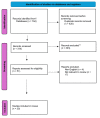Does Enhanced Recovery After Surgery Protocols Reduce Complications and Length of Stay After Thoracic Surgery: A Systematic Review of the Literature
- PMID: 38854276
- PMCID: PMC11161212
- DOI: 10.7759/cureus.59918
Does Enhanced Recovery After Surgery Protocols Reduce Complications and Length of Stay After Thoracic Surgery: A Systematic Review of the Literature
Abstract
Enhanced recovery after surgery (ERAS) has an increasingly important role in the perioperative management of thoracic surgical patients. It has been extensively studied in multiple surgical specialties, particularly colorectal surgery, where ERAS protocols have been shown to reduce postoperative length of stay and postoperative complications. Electronic searches of two research databases were performed: PubMed (1972 to October 2023) and Ovid MEDLINE (1946 to October 2023). The literature search was completed on January 4, 2024. Search terms included: "thoracic surgery" and "ERAS" or "Enhanced Recovery After Surgery". The search was limited to studies evaluating humans undergoing thoracic surgery for any indication. The primary outcome was overall morbidity, with secondary outcomes including mortality, length of stay, and pulmonary complications. The search yielded a total of 794 records, of which 30 (four meta-analyses and 26 observational trials) met the relevant inclusion and exclusion criteria. This review suggested the implementation of ERAS protocols can lead to a reduction in postoperative morbidity; however, this was not a consistent finding. The majority of studies included demonstrated a reduction in the length of stay with the implementation of ERAS. Overall, ERAS/ERATS is an important adjunct to the management of patients requiring thoracic surgery, consistently leading to shorter lengths of stay and likely contributing to reduced rates of postoperative morbidity. Further research will be required to determine the impact of the recently released ERATS guidelines.
Keywords: : enhanced recovery after surgery (eras); eras protocols; general thoracic surgery; lung surgery; thoracic surgeries.
Copyright © 2024, Goldblatt et al.
Conflict of interest statement
The authors have declared that no competing interests exist.
Figures
Similar articles
-
A systematic review of enhanced recovery after surgery for vascular operations.J Vasc Surg. 2019 Aug;70(2):629-640.e1. doi: 10.1016/j.jvs.2019.01.050. Epub 2019 Mar 25. J Vasc Surg. 2019. PMID: 30922754
-
[Modern Perioperative Care Concepts in Thoracic Surgery: Enhanced Recovery After Thoracic Surgery (ERATS)].Zentralbl Chir. 2024 Feb;149(1):116-122. doi: 10.1055/a-1823-1207. Epub 2022 Jun 22. Zentralbl Chir. 2024. PMID: 35732185 Review. German.
-
Enhanced Recovery After Primary Total Hip and Knee Arthroplasty: A Systematic Review.J Bone Joint Surg Am. 2021 Oct 20;103(20):1938-1947. doi: 10.2106/JBJS.20.02169. J Bone Joint Surg Am. 2021. PMID: 34166275
-
Enhanced Recovery After Surgery (ERAS) Protocols for Improving Outcomes for Patients Undergoing Major Colorectal Surgery.Cureus. 2023 Jul 12;15(7):e41755. doi: 10.7759/cureus.41755. eCollection 2023 Jul. Cureus. 2023. PMID: 37575751 Free PMC article. Review.
-
Enhanced Recovery After Surgery (ERAS) protocols following emergency intra-abdominal surgery: A systematic review and meta-analysis protocol.PLoS One. 2023 Sep 8;18(9):e0291140. doi: 10.1371/journal.pone.0291140. eCollection 2023. PLoS One. 2023. PMID: 37682876 Free PMC article.
References
-
- Guidelines for enhanced recovery after lung surgery: recommendations of the Enhanced Recovery After Surgery (ERAS®) Society and the European Society of Thoracic Surgeons (ESTS) Batchelor TJ, Rasburn NJ, Abdelnour-Berchtold E, et al. Eur J Cardiothorac Surg. 2019;55:91–115. - PubMed
-
- Systematic review of the influence of enhanced recovery pathways in elective lung resection. Fiore JF Jr, Bejjani J, Conrad K, et al. J Thorac Cardiovasc Surg. 2016;151:708–715. - PubMed
Publication types
LinkOut - more resources
Full Text Sources
Miscellaneous

